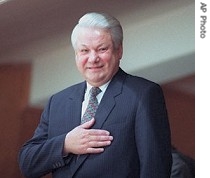-
(单词翻译:双击或拖选)
Washington
23 April 2007
Former Russian President Boris Yeltsin has died in Moscow at the age of 76. In this report from Washington, Senior Correspondent André de Nesnera looks at the Russian leader's legacy1.
| Russian President Boris Yeltsin waves as he arrives at Helsinki airport (File photo - 20 Mar 1997) |
Marshal Goldman is a Russia expert at Harvard University.
"The positive side, he helped bring about the collapse5 of the Soviet6 system, of communism - he brought in democracy, he brought in the market system," said Marshal Goldman. "But the negative side, from a Russian point of view, if you were Russian - under his administration, Russia lost its status as a superpower."
Few can forget the sight of Yeltsin - newly elected president of Russia - standing7 atop a tank in , declaring illegal an attempted hardline coup8 against Soviet president Mikhail Gorbachev.
Several months later - in December - Gorbachev resigned, bringing to an end the existence of the Soviet Union.
But in October 1993, President Yeltsin stunned9 the world by ordering the army to shell the parliament building occupied by anti-Yeltsin forces, including lawmakers.
Dale Herspring, a Russia expert with Kansas State University, says Yeltsin had no choice.
"He was working with a parliament that was pretty-much communist dominated and what he did was completely illegal but he felt that he had to destroy them in order to get communism out," said Dale Herspring.
 |
| Boris Yeltsin (file photo) |
Analysts11 say on the economic front, Yeltsin's record was also mixed.
Robert Legvold, a Russia expert with Columbia University, says the Russian president wanted to introduce economic reforms to break with the Soviet past.
"But it was not well-designed and the West was not terribly effective, including the United States, in providing sound advice to him on how he might go about something that he didn't understand," said Legvold. "And so in effect he did smash the soviet economic machinery12, but he put in its place a kind of ruthless, even crony - and in the public mind - discredited13 form of capitalism14 which has since then created basic problems of legitimacy15 for the economic system that the Russians have."
Legvold says corruption16 was not a new phenomenon either in the Soviet Union or in Russia. But he says it reached unprecedented17 heights in the Yeltsin era because of the nature of the reforms - privatization of state-owned enterprises.
"He continually said that his regime needs to fight against it [corruption], just as the Putin regime has said they must fight against it - but they've never found an effective way to do it," he said.
Experts say history will remember Boris Yeltsin as a leader who fluctuated between democratic tendencies and authoritarian18 actions. They say Russia under his watch was a far more open place than it was under soviet times. But they also say Yeltsin's hand-picked successor - Vladimir Putin - is reverting19 back to authoritarian rule to correct what the current Russian government believes was the chaos20 and uncertainty21 of the Yeltsin years.
 收听单词发音
收听单词发音
1
legacy

|
|
| n.遗产,遗赠;先人(或过去)留下的东西 | |
参考例句: |
|
|
|
2
mar

|
|
| vt.破坏,毁坏,弄糟 | |
参考例句: |
|
|
|
3
presidency

|
|
| n.总统(校长,总经理)的职位(任期) | |
参考例句: |
|
|
|
4
contradictory

|
|
| adj.反驳的,反对的,抗辩的;n.正反对,矛盾对立 | |
参考例句: |
|
|
|
5
collapse

|
|
| vi.累倒;昏倒;倒塌;塌陷 | |
参考例句: |
|
|
|
6
Soviet

|
|
| adj.苏联的,苏维埃的;n.苏维埃 | |
参考例句: |
|
|
|
7
standing

|
|
| n.持续,地位;adj.永久的,不动的,直立的,不流动的 | |
参考例句: |
|
|
|
8
coup

|
|
| n.政变;突然而成功的行动 | |
参考例句: |
|
|
|
9
stunned

|
|
| adj. 震惊的,惊讶的 动词stun的过去式和过去分词 | |
参考例句: |
|
|
|
10
tarnished

|
|
| (通常指金属)(使)失去光泽,(使)变灰暗( tarnish的过去式和过去分词 ); 玷污,败坏 | |
参考例句: |
|
|
|
11
analysts

|
|
| 分析家,化验员( analyst的名词复数 ) | |
参考例句: |
|
|
|
12
machinery

|
|
| n.(总称)机械,机器;机构 | |
参考例句: |
|
|
|
13
discredited

|
|
| 不足信的,不名誉的 | |
参考例句: |
|
|
|
14
capitalism

|
|
| n.资本主义 | |
参考例句: |
|
|
|
15
legitimacy

|
|
| n.合法,正当 | |
参考例句: |
|
|
|
16
corruption

|
|
| n.腐败,堕落,贪污 | |
参考例句: |
|
|
|
17
unprecedented

|
|
| adj.无前例的,新奇的 | |
参考例句: |
|
|
|
18
authoritarian

|
|
| n./adj.专制(的),专制主义者,独裁主义者 | |
参考例句: |
|
|
|
19
reverting

|
|
| 恢复( revert的现在分词 ); 重提; 回到…上; 归还 | |
参考例句: |
|
|
|
20
chaos

|
|
| n.混乱,无秩序 | |
参考例句: |
|
|
|
21
uncertainty

|
|
| n.易变,靠不住,不确知,不确定的事物 | |
参考例句: |
|
|
|















